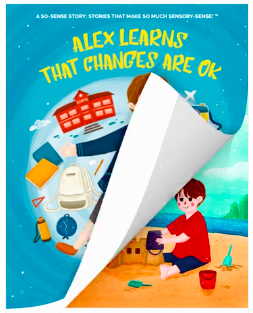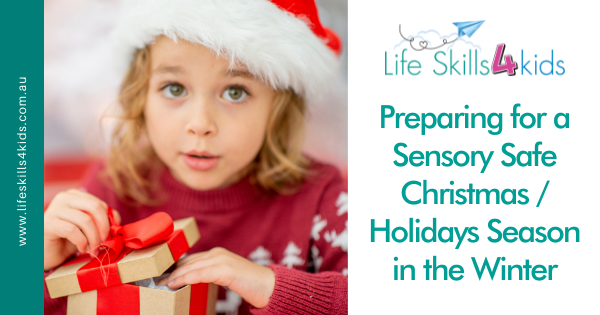LifeSkills4Kids is based in Australia, but we know that some of our readers live on the other side of the world, where your Christmas will be considerably colder!
So, let’s take a look at preparing for a sensory safe Christmas during the winter months. There will of course be many similarities whether Christmas arrives in summer or winter time. Have a look at our article about a Sensory Safe Christmas Day.
Top Tips for a Sensory Safe Christmas in Winter
Be Mindful of “The Winter Blues”
- Many of us can struggle to cope with the darker days and nights that winter can bring
- There is a lot of research around Seasonal Affected Disorder (SAD) which can lead to depression
- SAD can affect our kids too! We all know what it is like when the weather is cold, wet and dreary – it can greatly effect your mood and make you feel sad, tired and unsociable
- As parents, we also know that if our kids get tired they are more likely to have meltdowns and experience sensory overload
Dealing with The Winter Blues
- Christmas time can assault the senses from EVERY angle!
- How do we help our young person to deal with Christmas when they may also be affected by SAD?
- These days there are many light therapy boxes available to help people with SAD – they do not claim to be a total cure, but they provide natural light during the winter months which can help alleviate feelings of tiredness and general lethargy
- There are also light boxes which can help you wake up, by simulating the dawn and therefore providing help to wake up naturally in the morning (even if it is still dark outside!)
A Sensory Safe Winter Christmas
Pre-Planning
- Make sure you involve your kids in all aspects of the planning of your activities at Christmas time
- Make a Christmas planner together – start the planner as soon as possible – so that your child has plenty of time to assimilate what is happening and prepare themselves for as many eventualities as possible
- Discuss with your young person where the trigger points might be and come up with plans together which could help them cope with these triggers
- Prepare your extended family and friends by letting them know what the triggers might be too and how they can help
Extended Family and Friends
- All of the people that care about you and your family will want to help make Christmas a wonderful time together
- Prepare them well in advance so that they can help make visits to their house as easy as possible
- Ask them to provide one or two foods that you know your child will like and ask them if they could keep a little space as a quiet place for your child to have a sensory time out if they need one
Winter Clothing
- You will know if your child has any issues with clothing types
- Make sure that you have winter clothing that is made with the right materials, with user-friendly labels and colours
- Make a game out of wearing gloves/hats/scarves and give your child lots of options and choices
- Winter clothing can be quite heavy – which is often good for children with sensory processing issues, the heavy clothes can mimic the same calming effect as a weighted blanket
- A weighted blanket can be a great way to help your child feel relaxed and chilled out when you are out and about. You can take the blanket with you and use it for travelling and for visiting different venues at Christmas-time
Winter Activities
Whatever activities you plan to do over the Christmas holidays, it can be a great idea to do them with your child first before the holidays. This can provide your child with a chance to practice and learn new skills in a safe environment. When you repeat these activities in a slightly larger group, your child is much more likely to be able to cope.
For example, if you plan on going ice skating over the festive season (many towns have temporary ice rinks), your child can really benefit from checking out the area, the ice rink and having a go with just you and your close family. This will give them the confidence to enjoy this activity in a larger group at a later date. A pre-visit will also help to find out what triggers may be present, so that you can plan strategies to cope with them.
Decorations and Presents
- When you are decorating your house and your tree, it is really helpful if you can do this with your kids
- They will then be able to tell you if any of the decorations/lights are triggers for anxiety or sensory meltdowns
- Encourage your kids to make some decorations that feel safe and calm for them
- When you are opening presents, it is often really helpful for your kids with sensory issues to open one gift at a time. This provides them with the opportunity to open presents in a methodical, calm manner. It will take longer this way, but it will be much easier for all of you!
- Provide plenty of breaks when opening presents and be prepared for your child to withdraw into their safe space or use their sensory toolkit to help them get through this time.
- Opening presents can be a frantic experience – allow your kids to take their time, move at their pace and enjoy the day as much as possible
Social Stories at Christmas
- Creating a social story or several of them can be really helpful for your young person
- A social story can help them with cues about how to receive gifts; how to react when they are visiting the extended family and many other activities around Christmas
- If at all possible, create the social story together with your young person, so that they have valid input and feel that they are included in every aspect of the story
Other Articles from LifeSkills4Kids with more tips on surviving the holidays :
- Reducing Anxiety for End of Term
- A Sensory Safe Christmas
- How to Transition from School to Home
- Tips for Reducing Anxiety at Christmas
- Creating A Sensory Safe Corner At Home
- Helping Hyperactive & Busy Kids
- Tips for Travelling with Children
- Fireworks Survival Guide
- Minimising Tantrums at the Shops
Written by Deb Hopper, Occupational Therapist
ALEX LEARNS FLIPBOOK
Alex loves school. He enjoys all the activities he does during the term such as swimming and soccer. He also loves holidays and all the fun things he gets to do while he’s not at school. The problem is, Alex doesn’t like changes. His tummy gets all tight and he gets a worry cloud that comes over his brain and makes it feel foggy. When the school term ends and holidays begin or when school is about to start again, Alex feels really worried and anxious.
When you purchase the Alex Learns that Changes are OK (Flipbook), you will receive a digital flipbook that gradually changes from one page to the next while listening to high-quality audio narration as if someone is flipping and reading the book for you!


